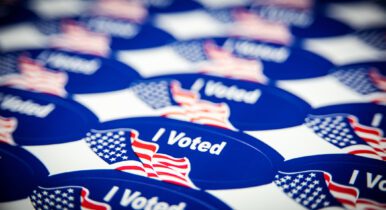How Podcasts Shaped the 2024 Race – and What it Means in 2026
Podcasts played a pivotal role in swinging key voting blocs toward President Donald Trump in the 2024 election and could hold the key for Democrats seeking to rebuild their splintered political coalition in next year’s midterms.
New polling from the podcast agency Voxtopica and audio research firm Signal Hill Insights, shared with Campaigns & Elections, paints a picture of how podcasts helped shape the contours of the last presidential race. And as Democrats try to revamp their strategy and message ahead of the 2026 midterms and 2028 presidential election, the data offers some clues about what happened in 2024 and makes the case for why politicians should more readily embrace podcasting as a voter outreach tool.
Among self-identified registered voters who have listened to at least one podcast in the past month, half said that podcasts had at least some influence over how they voted on Election Day 2024, according to the survey. Those voters broke solidly in favor of Trump; 54 percent said they voted for the current president, while 45 percent said they cast their ballots for former Vice President Kamala Harris.
When it came to certain demographics, however, the results were even more skewed in Trump’s favor. Fifty-four percent of 18-to-34-year-olds who said that podcasts influenced their vote in 2024 swung for Trump last November, compared to 43 percent who voted for Harris.
Among Black voters who said they were influenced by podcasts, 29 percent voted for Trump, according to the polling. By comparison, Trump won about 13 percent of Black voters nationally, according to exit polling.
Hispanic voters whose votes were swayed by podcasts also swung slightly more for Trump, backing the president 49 percent to Harris’ 48 percent. Nationally, exit polling found Trump winning about 46 percent of the Hispanic vote and Harris taking 51 percent.
The data reflects a much-discussed topic among Democratic strategists and consultants, who have faulted Harris for steering away from podcast appearances and other new media in favor of a more traditional campaign. Trump and his Vice President J.D. Vance, on the other hand, repeatedly sat for long, winding podcast conversations on popular shows, like “The Joe Rogan Experience.”
“When we think about one of the mistakes that the Harris campaign made, it was that you had Trump and Vance going on three-hour shows without batting an eye while Harris refused to do those things,” Richard Fawal, the CEO of Voxtopica, told C&E. Voxtopica is briefing select organizations on the survey’s findings.
The data from Voxtopica and Signal Hill Insights found that Harris voters were more likely to rank TV news as their most important medium for evaluating candidates and their platforms, while podcasts came in second place. Trump voters, meanwhile, said podcasts were their No. 1 platform for evaluating candidates.
But Fawal said it would be wrong for Democrats to assume that podcasts aren’t an important voter outreach tool.
“My message is: on the surface, it looks like Democrats don’t pay that much attention to podcasts, but in reality, what this says is that the people who paid attention to podcasts became Republicans,” Fawal told C&E, adding that: “Democrats have a huge opportunity to rebuild their base if they do [podcasting] right.”
The key, according to Fawal, is “authenticity.” Democrats, he argued, often approach podcast appearances as an opportunity to “repeat the same talking point” that they may have already made on CNN or MSNBC.
“A lot of the podcast networks and shows on the right are fundamentally cultural, not political. And what the left keeps trying to do is they’re trying to make podcasts that are political,” Fawal said. “If you’re a Democrat that hunts, go on hunting shows.”
According to Voxtopica and Signal Hill Insights’ polling, voters who listen to podcasts are simply more likely to pay attention to politicians when they’re guests on podcasts, compared to other media. Seventy-six percent of respondents said that they pay either “some” or a “great deal” of attention to politicians on podcasts, while 74 percent said the same of politician appearances on television.
That trend is even more pronounced among Black voters and Hispanic voters, 88 percent and 84 percent of whom said that they pay more attention to politicians on podcasts, respectively.
The poll also suggests that there’s little downside to investing in a podcast strategy. More than eight-in-ten respondents said that hearing views that they disagree with on a podcast doesn’t affect their opinions of the advertisers on that podcast. Likewise, 50 percent said that they have a more positive opinion of candidate ads on podcasts than on other media.
The survey is based on online responses from 1,000 self-identified registered voters who said that they have listened to at least one podcast in the last month. The sample is based on quotas set to census region, age, gender, education and race.


